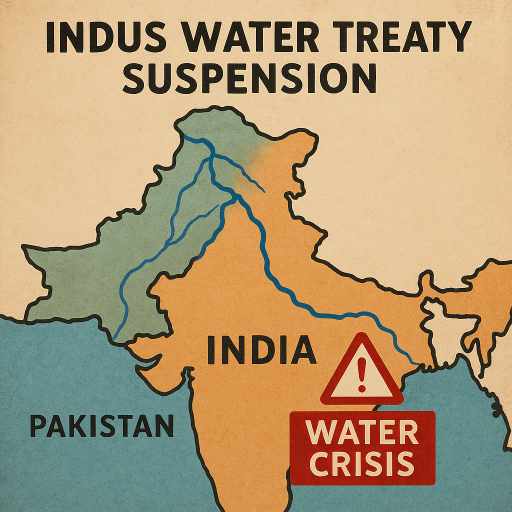Background: What is the Indus Water Treaty?
Signed in 1960, the Indus Water Treaty (IWT) is one of the most significant water-sharing agreements in the world. Brokered by the World Bank, it divided six rivers between India and Pakistan. The three eastern rivers—Ravi, Beas, and Sutlej—were allotted to India, while the three western rivers—Indus, Jhelum, and Chenab—were assigned to Pakistan.
For decades, the treaty has withstood wars and diplomatic tensions, serving as a rare symbol of cooperation between two nuclear-armed neighbors.
What Happened Recently?
On April 22, 2025, a deadly militant attack in Pahalgam, Kashmir killed 26 civilians. India immediately blamed Pakistan-based groups for the incident and responded by suspending its participation in the Indus Water Treaty. The Indian government cited “national security threats” as the primary reason for the suspension.
This unprecedented move has raised serious concerns about water scarcity and regional stability in South Asia.
Impact on Pakistan: A Brewing Water Emergency
1. Agricultural Devastation
Pakistan relies heavily on the Indus river system for irrigation. Over 80% of its agricultural land depends on the western rivers. With reduced water flow, crops like wheat, rice, and cotton—critical to Pakistan’s economy and food security—are at risk of failing.
Farmers in Punjab and Sindh are already reporting delayed sowing and poor crop yields due to lower water availability.
2. Power Shortage Worsens
Pakistan’s hydroelectric infrastructure is built along the Indus and its tributaries. With water flow restricted, hydropower production is plummeting. Load-shedding is becoming routine in urban and rural areas alike, impacting businesses, hospitals, and households.
3. Protests in Sindh
The southern province of Sindh has been hit the hardest. Massive protests have erupted across cities like Hyderabad, Sukkur, and Larkana. Activists blame the federal government for failing to protect Pakistan’s water rights and demand immediate diplomatic action.
The government, under mounting pressure, has delayed controversial canal projects and promised to raise the issue at global forums.
India’s Justification and Strategy
Indian officials claim that Pakistan is violating its commitments by supporting militant networks, and hence, does not deserve the privileges offered under the treaty. Though India has not officially abrogated the treaty, it has begun building storage projects and diversions on rivers meant for Pakistan.
Experts believe this is part of India’s strategy to put pressure on Islamabad without crossing into armed conflict.
International Response: Disappointing Silence
Pakistan has appealed to the United Nations, World Bank, and key allies to intervene. However, the response has been lukewarm. The World Bank, a guarantor of the treaty, has stated it has no jurisdiction over unilateral suspensions.
Global attention remains focused on other conflicts, and South Asia’s water tensions are slipping under the radar.
What Can Be Done: Solutions for a Shared Future
1. Reviving Diplomatic Dialogue
Despite the tension, experts urge both nations to return to the negotiating table. Water is too critical a resource to be weaponized. Dialogue must prioritize humanitarian and environmental concerns over political rivalry.
2. Legal and Multilateral Pressure
Pakistan may consider taking the case to the International Court of Justice (ICJ), or push for arbitration under international water laws. Multilateral pressure, especially from the Gulf and China, could help mediate.
3. Domestic Water Reforms in Pakistan
Pakistan must also introspect. It needs to invest in modern irrigation techniques, build water reservoirs, fix leakages, and launch nationwide awareness campaigns on water conservation.
Conclusion: A Crisis We Cannot Ignore
The suspension of the Indus Water Treaty marks a dangerous shift in South Asian geopolitics. For Pakistan, it’s not just a diplomatic setback—it’s a full-blown water crisis. Without timely intervention and cooperative diplomacy, millions may suffer.
The world cannot afford to stay silent as one of the most populous regions on Earth moves towards a water war. The time for action is now.

